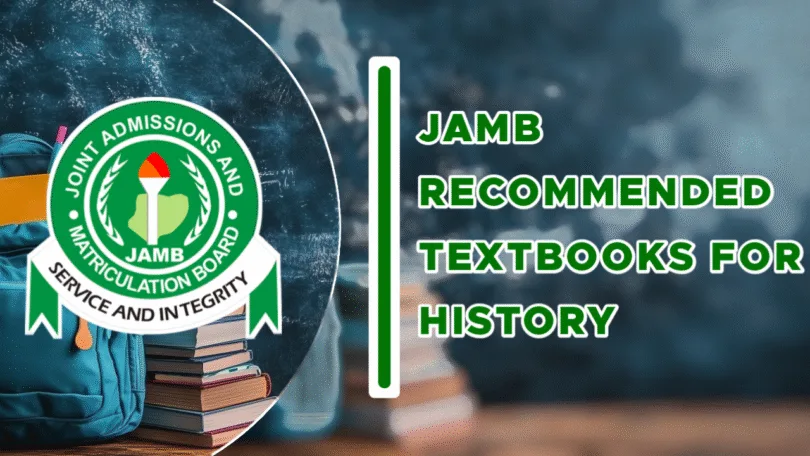This article provides a list of JAMB Recommended textbooks for History to choose from and use for study, as well as study tips for History. History is a very fascinating subject. It takes a person down memory lane and reminds learners about past events and their contributions to the evolution of modern society.
Preparing for this subject in JAMB UTME involves much studying and familiarization of one’s with events, their date, and the persons involved in making them happen. When it comes to history, one thing is to know, and another is to recall accurately.
Comprehensive List of JAMB Recommended Textbooks History 2026/2027
Provided for you below are the recommended history textbooks for 2026/2027 UTME:
- Abba, A (2006): The Politics of Mallam Aminu Kano, Kaduna Vanguard and Publishers.
- Ayandele, A. E. et al (1986): The Making of Modern Africa, The Twentieth Century Vol 2., Longman.
- Ajayi and Cowther (1971): History of West Africa Vol. I, London, Longman.
- Ajayi and Crowther (1974): History of West Africa Vol. II, London, Longman
- Akinloye, S. A. (1976): Emergent African States: Topics in Twentieth Century African History, Longman.
- Akinyemi, A. B., Agbi, S. O and Otunbanjo, A. O. (eds) (1989): Nigeria since Independence: The First 25 years. (International Relations) Vol x, Heinemann. Ibadan.
- Anene J. C. and Brown, G (1966): African in the 19th and 20th centuries, Ibadan: University Press.
- Anene J. C. (1966): Southern Nigeria in Transition, 1885 – 1906, Cambridge: University Press.
- Anene, J. C and Brown, G (eds) (1972): African in the Nineteenth and Twentieth Centuries: A Handbook for Teachers and Students, Ibadan: University Press and Nelson.
- Ashiwaju A. I., Croder, M and Denzer, I. R. (eds) Tariki 25, Grassroots Leadership in Colonial West Africa, Vol. 7, London: Longman.
- Atanda, J. A. Ashiwaju, G and Abubakar, Y. (eds) (1989) Nigeria since Independence: The First Years: Religion Vol. i., Ibadan Heinemann.
- Barkindo, B. et al (1989): Africa and the Wider World, Vol. 1. Lagos: Longman.
- Barkindo, B. et al (1996): African and the Wider World, Vols. 2 and 3, Lagos: Longman
- Boahen, A (1969) The Revolutionary years: Africa since 1800 Longman publishers.
- Boahen, A (1969): The Revolutionary years: West Africa since 1800, Longman Publishers
- Sokoto Caliphate: History and Legacies, 1804 – 2004, vols. I and II, Kaduna: Arewa House.
- Celeman, J. S. (1986) Nigeria: Background to Nationalism, Benin: Broburg and Wistrom.
- Clerk, T. A. (1991): Right Honourable Gentleman: The Life and Times of Alhaji Sir Abubakar Tafawa Balewa, Zaria: Hudahuda Publishing Company.
- Cohen, D. I. and Daniel, J. (eds) (1981): Political Economy of Africa: Selected Readings, London, Longman.
- Crowther, M. West Africa: An introduction to its History, Longman,1977.
- Crowther, M. Nigeria: An introduction to its History, London: Longman,1979.
- Dike, K. O. (1956): Trade and Politics in the Niger Delta, London: Oxford University Press.
- Ekeh, P. P and Ashiwaju, G. (eds) (1989): Nigeria since Independence: The First 25 Years: Culture, Vol. VII, Ibadan: Heinemann.
- Falola, T. et. al (1989): History of Nigeria Vol. I, Lagos: Longman.
- Falola T. et. al (1989): History of Nigeria Vol. 2 and 3, Lagos: Longman.
- Gboyega, A., Abubakar, Y and Aliyu Y. (eds) (1989): Nigeria since Independence: The First 25 Years Public Administration, Vol. III, Ibadan: Heinemann.
- Hallet, R. (1975): Africa since 1875, Ibadan: Heinemann.
- Hopkins, A. G. (1973): An Economic History of West Africa, Longman.
- Ikime, O and Osoba, S. O. (eds) Tarikh: Independence Movement in Africa (Part I), Vol. 3, No. 4 London: Longman.
- Ikime, O and Osoba, S. O. (eds) Tarikh: Government in Pre-Colonial Africa, Vol. 4, No. 2 London, Longman
- Ikime, O and Osoba, S. O. (eds) (undated): Peoples and Kingdoms of West Africa in the Pre-colonial Period, Vol. 5, No. 1 London: Longman.
- Ikime, O and Osoba, S. O. (eds) (undated) Tarikh: Europeans Conquest and African Resistance (Part 2), Vol. 4, London: Longman.
- Ikime, O (1977) The Fall of Nigeria: The British Conquest, London: Heinemann.
- Ikime, O (ed) (1974) Leadership in 19th Century Africa: Essays from Tarikh, London: Longman
- Ikime, O. (1968) Merchant Price of the Niger Delta, London: Heinemann.
- Ikime, O. (ed) (1980) Ground work of Nigerian History, Ibadan: Heinemann.
- Iseihei, E. (1983) A History of Nigeria, London: Longman.
- Jorre, J. D. (1972) The Nigeria Civil War, London: Hordder and Stoughton.
- Kani, A. M. and Gandi, K. (1990) A State and Society in the Sokoto Caliphate, Series I, Usman Danfodio University, Sokoto.
- Mahdi, A., Kwanashei, G. A and Yakubu M. (eds) (1994) Nigeria: The state of the Nation and the Way Forward, Kaduna: Arewa House.
- Mahdi, A., Kwanashei, G. A and Yakubu M. (eds) (1994) Nigeria: The state of the Nation and the Way Forward, Kaduna: Arewa House.
- Martin, P. M and Omera, P. (1995) (eds) Africa (Third Edition), Bloomington: Indiana University Press.
- Mohammed, B. (1982) Africa and Non-alignment: A study in the Foreign Relations of New Nations, Kano: Triumph Publishers.
- Mohammed A. S. and Adamu, S.(eds) (2005) Nigeria and the Reform of the United Nations, Zaria: Hanwa.
- Nzula, A. T., Potekhin and Zusmanovich (1979) Forced Labour in Colonial Africa, London: Zed Press.
- Offiong, D. A. (1980) Imperialism and Dependency: Obstacles to Development, Enugu: Fourth Dimension Publishers.
- Ojigbo, O. (1982) Shehu Shagari: The Biography of Nigeria’s First Executive President, Yugoslavia Mlandiska Knjiga.
- Okafor, I. (1989) History for Senior Secondary Schools, Onitsha, Jet Publishers.
- Oliver, T. and Afmore, A. (1996) Africa since 1880 (Fourth Edition) New York: Cambridge University Press.
- Olusanya G. O. (1973) The Second World War and Politics in Nigeria, 1939 – 1953, Ibadan: Evans.
- Omar O. (1966) The Zulu Aftermath: A Nineteenth-Century Revolution in Bantu Africa, London: Longman.
- Omolewa, M. (1986) Certificate History of Nigeria, Lagos: Longman.
- Onoja, I. (1998) Peace-keeping and International Security in a Changing World., Jos: Mono Expressions.
- Onwubiko, K. (1983) School Certificate History of West Africa, Onitsha: African – First Publishers.
- Tamuno, T. N. and Atanda A. (eds) (1989) Nigeria since Independence: The First 25 Years. Vol. III, Ibadan: Heinemann.
- Tamuno, T. N. and Atanda J. A. M. (eds) (1989) Nigeria since Independence: The First 25 Years. (Government and Public Policy), Vol. IV, Ibadan: Heinemann.
- Tamuno, T. N. and Ukpabi, S. C. (eds) (1989) Nigeria since Independence: The First 25 Years (The Civil War years). Vol. IV, Ibadan: Heinemann.
- Thompson, L. A. (2000) History of South Africa, Yale: Yale University Press.
- Usman Y. B. (ed) (1979) Studies in the History of Sokoto Caliphate, New York: Third Press International.
- Usman Y. B. (ed) (1981) The Transformation of Katsina, 1400 – 1883, Zaria: Ahmadu Bello University Press.
- Usman Y. B. (ed) and Alkali M. N. (1983) Studies in the History of Pre-Colonial Borno, Zaria: NNPC.
- Usman Y. B. and Kwanashei, G. A. (eds) Inside Nigeria History 1950-1970: Events: Issues and Sources (Presidential Panel on Nigeria: Since Independence), University of Ibadan.
- Usman Y. B. (ed) (1989): Nigeria since Independence: The First 25 Years: The Society Vol.I, Ibadan: Heinemann.
- Usman Y. B. (2002) Election Violence in Nigeria: The Terrible Experience, 1952 – 2002, Zaria: Abdullahi Smith Centre for Historical Research.
- Webster, J. B. and Ikime, O. (eds) Tarikh: Early African Christianity, Vol. 2. No. 1. London: Longman.
- Wilmot, P. F. (1980): Apartheid and African Liberation: The Grief and the Hope, Ife: University of Ife Press.
- Yakubu, A. M., Jumare, I and Saeed, A. G. (eds) (2005) Northern Nigeria: A century of Transformation, 1903 – 2003, Kaduna: Arewa House.
- Yakubu A. M. (2006) Emirs and Politicians: Reform, Reactions and Recrimination in Northern Nigeria, 1950 – 1966, Kaduna: Baraka Publishers.
Why is it so important to use the list of recommended textbooks?
The major problems the recommended textbooks promise to solve are firstly, the stress and error attached with making the choice of what textbook to use, and secondly, the overall impact it will have on your examination score.
Key Skills that are Highly Beneficial to Scoring High in JAMB History 2026
- Chronological understanding: History and past events have an order by which they happened and are recorded in dates. Chronological understanding is simply the ability to understand and be able to organize those events in the correct order. For instance, here is a past question to illustrate the importance of this skill;
Arrange the following in events in Nigeria in Chronological order:
- British colonization of Nigeria
- Nigerian independence
- Nigerian Civil war
- British colonization, Nigerian independence, Nigerian Civil war.
- Nigerian independence, British colonization, Nigerian Civil war.
- Nigerian Civil war, British colonization, Nigerian independence.
- British colonization, Nigerian Civil war, Nigerian independence.
Answer: Option A is the correct answer (British colonization, Nigerian independence, Nigerian Civil War).
- Historical analysis: Another beneficial skill to develop in studying history in preparation for JAMB/UTME 2026/2027 is the ability to analyze historical events which will include the identification of the causes of events, the consequences they incurred and their significance.
- Accurate recalling: In studying for history, events and their dates are a very significant aspect of the subject. Ensure to commit these events and their respective dates to heart by memorizing them so as to recall them during the examinations with accuracy.
How to Study Using the JAMB Recommended Textbooks for History
- Study the topics provided in the JAMB syllabus for History 2025/2026: Study and familiarize yourself with the topics as provided for you by the syllabus.
- Employ the use of past questions on History: This will help you understand and familiarize yourself with the patterns of the questions, how are being set from year to year. It is of most importance to study and answer past questions of at least three (3) years.
- Revise regularly: Dates of events and their chronology among other things in history may take a considerate amount of effort in revision to be able to recall them accurately. Do not just read and move on to the next thing without making plans to revise what you have previously read.
Conclusion
Do your best in study with the right textbooks whose list have been provided for you above, revise what you have studied, and the use past questions for at least two to three years is advised and you will be set for an excellent performance in the 2026/2027 UTME/JAMB examination.
Frequently Asked questions (FAQs)
How many questions am I expecting to answer on History during my Jamb examination?
You will be provided with 40 questions in History for your JAMB/UTME examination and you are meant to answer all the questions leaving none unanswered.
Do JAMB ever repeat past questions in History?
Yes, JAMB repeats past questions but they often modify them and make them appear fresh and unique.
How much time should I spend in history alone during my examination?
In total, you have two hours (120 minutes) to answer 180 questions. This time is not automatically divided for you into subjects by the examination software; you are required to manage your time across all four subjects within the stipulated time. Therefore, allocate time to each subject depending on its complexity and avoid dwelling too long on a subject.





